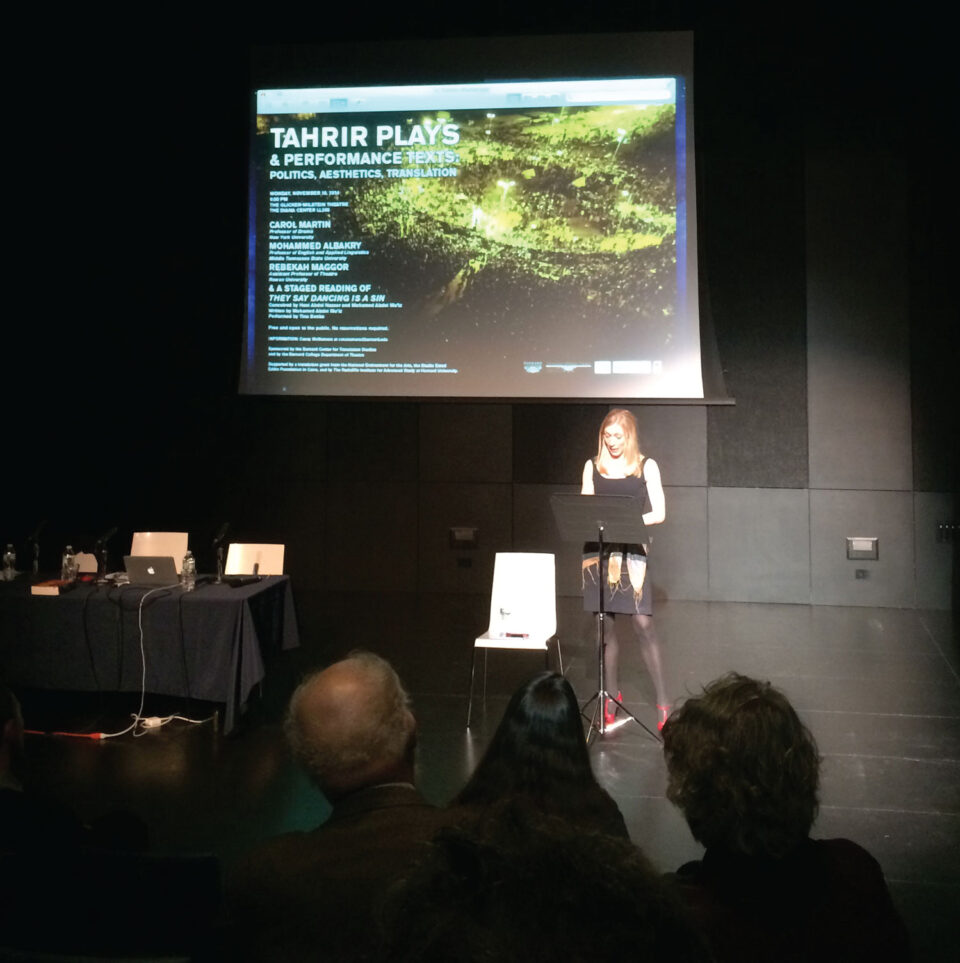Set against the backdrop of a burning Tahrir Square, The Crocodiles is narrated in numbered, poem-like prose paragraphs by a man looking back on the magical and explosive period of his life when he and two friends started a secret poetry club amid a time of drugs, messy love affairs, violent sex, clumsy but determined intellectual bravado, and re-translations of the Beat poets. Youssef Rakha’s provocative, brutally intelligent novel of growth and change begins with a suicide and ends with a doomed revolution, forcefully capturing thirty years in the life of a living, breathing, daring, burning, and culturally incestuous Cairo.
196. She was saying, “That’s why I’m telling you,” when Nayf’s palm settled on her cheek. And when the palm slid down to her neck she went on, “You’re a son of a dog’s religion of a coward. Am I right or what? When you said that it makes no difference…”
197. It wasn’t a slap precisely, though the arm was raised, the palm stretched rigid and the shoulders a straight line through a circle’s center. It was like the threat of a slap, which Moon would have returned immediately had she not lost her balance beneath the weight of the slapper, now standing over her head. As he turned to face her, she tottered and swayed, until she came to rest cross-legged on the couch, her long summer dress hitched up to show a brown and slender thigh. At which point she looked him in his eyes again. She herself did not know if something in her gaze was different but it no longer fazed him that she looked.
198. A thigh, brown and slender, but aglow and suffused, and her long, thick hair, numberless streaked chestnut strands gathered in a ponytail, and her, looking at him. Did Nayf recall the lion? Did the recollection affect an energy pulsing in his body that was like desire and was not desire? A rosy thigh and thick hair and breath of basil with a pulsing energy and her hair and a brown and slender thigh.
199. Moon did not flinch as the palm encircled her nape, the thumb settling on her windpipe, and it did not seem that she was immediately aware of Nayf’s other hand tugging the ponytail down as he returned to his seat beside her, chest-out this time; only, with the thumb’s pressure and her head tilted back, her voice became strangled till she stopped speaking, then a faint whine was heard followed by panting—her lips clamped tight—as though it did not come from her. And though she did not laugh when he hissed in her ear, “The son of a dog’s religion is your mother’s father,” it came as no surprise to him that she didn’t resist. “Your mother’s father…daughter of a whore.” He was bringing his face up to hers so that his forehead settled on her nose, as if to crush it. And she was pressing her lips together ever more violently, her breath was drawing closer while her knees parted little by little, further and further.
200. Recalling a gathering of The Crocodiles which took place weeks before that night, I can almost hear Nayf cackling derisively at a scene of a masked man flogging two pale buttocks, all that showed of a woman straitjacketed in steel and black leather, on the Internet. How, then, could his thumb now be about to crush the windpipe of a girl kneeling on phosphorescent plush? Later, Moon will tell him that the marks left by his hands and teeth, if she had seen or heard of them on any other girl just a day before that night, would have filled her with disgust.
201. “And yet,” she will go on, with that sour grin of hers that scattered the beauty from her face, “it seems I like abuse and caveman stuff. With you, baby, I’ve found what I deserve.”
202. In 2001, and up till now perhaps, in our conception of civilization—Nargis’s and Saba’s conception, Moon’s conception, of being civilized— the sweetness of sex was incompatible with physical violence. Especially when the violence came from a man and was directed at a woman, we viewed it as nothing more than a brute machismo exercising its unreconstructed masculinity; it never occurred to one of us that it might be probing psychological depths quite unrelated to any worldview blowing in from behind the buffalo. Power, possession, and absolute loyalty—unlike “evolution”—were things we distanced ourselves from with all our might. A man beating a woman to arouse himself or her would be raping her, subjugating her body, something that repelled us to the utmost degree. Yet we needed violence more than anything. Perhaps this need for violence—our need to feel the power of possession and a desire for an absolute loyalty to justify our lives, for the temptation to recreate some person in the world other than ourselves—perhaps this was what set Nayf in motion and loosed an energy in his body that resembled desire, yet was not, or not just.
203. So it was that when she did not part her lips as they made contact with his mouth, which had suddenly grown wet, he did not hesitate to lick them then bite them harder and harder until he was barely stopping himself from drawing blood. And after her hands came to rest beneath his shoulders on the pretext of pushing him away— she wasn’t pushing him but pulling him in, planting her fingers through the back of the T-shirt and into his ribs—Nayf was astonished at himself for the savagery with which he bit Moon, cheek and neck and likewise, after lowering the dress from her shoulders and pulling off her bra, bit her breast.
204. Her breast, in size and shape: a lemon; but the nipple was black and very large, a charcoal knuckle, and when his teeth encircled it at the root as though to nip it off—the nipple, I mean—its owner would open her lips wide for the first time and her basil scent would blend with something between pepper and smoke and she would not make a sound. As though the groan that came from her before signified a resistance now broken in the face of a more profound and authentic pain; precisely as though the pain was (and leaving aside what we’d repeat among ourselves Paulo, Nayf, and I—that a person who’d lost pleasure or despaired of it must cling to pain as the only way to feel alive…As I write, in this moment, about myself, I believe that what keeps me alive, confronted by reports of parliamentary elections ongoing since November, is the pain of those twitching on the asphalt after inhaling gas, of those struck by bullets in their eyes, of those stampeding from the scourge of billy clubs and electric cables…The pain, that biting light in whose absence no one perceives a thing); as though the pain were, for Moon, the key to a locked door behind which lay her truth, which she would never confess except in jest or without conviction—all her lies in the mirror—and which, consequently, she could not express in any voice whatever.
205. I see him slapping her seriously this time then, while circling her until he stood behind her as she knelt, twisting her arms behind her with one hand and with the other pulling off her underwear then lowering his trousers to enter her as though ramming a plank of wood into a wall cavity—all this in a single movement, like lightning—and he found her wet and easy—as I was not to find her, at first—and leaned over her back all overlain with gleaming chestnut hair to breathe in the smoke and pepper and search for a trace of basil, which drew further and further away amidst a throbbing pressure, only to return damply with her panting.
206. Then, as Nayf leant over Moon’s back, he would sink his hands into the curve of her flesh and yank her bunched hair, rake it back, and insert his whole thumb into her anus to lift her sex towards him, would reach out his hand to mash her nipple between two fingers then fall to smacking her rump again. And with the resolve of a saint tortured by Romans on the shore of the Red Sea, she would hold back from crying out—not a sound except her faint pants broken, despite herself, by eruptions of a lowing or a braying she fought to quell—until the moment that her small, brown body quaked, spasm after spasm, having pulled her arms from his grasp and settled on all fours, writhing in something like a fit, a freshly slaughtered panther, biting the green plush as he loomed upright then knelt upon the couch’s edge, his feet still on the living room floor.
207. The oblivious body. That solicits a violence it did not know it wanted. That is offered up in sacrifice to something other than whatever it is that constitutes life in Egyptian society. Far from ideas of for-shame and thou-shalt-not, but far, too, from sticking to principles, no matter how straightforward and true the principles might be. The body, which I, Gear Knob, knew as boisterous, tyrannical for all its triviality, and in which I got to know The Crocodiles’ full stink, in one go; maybe Nayf intuited from her silence beneath this pain the truth of its moans. And forgot the lion. As he withdrew from Moon and left her bundled on the couch, still erect himself, yet to come—as he hurried to his bedroom to fetch two scarves and a fat candle in the shape of an apple—perhaps he forgot that a flesh and blood lion had been tormenting him for weeks.
Youssef Rakha, The Crocodiles, trans. Robin Moger (New York: Seven Stories Press, 2014).









